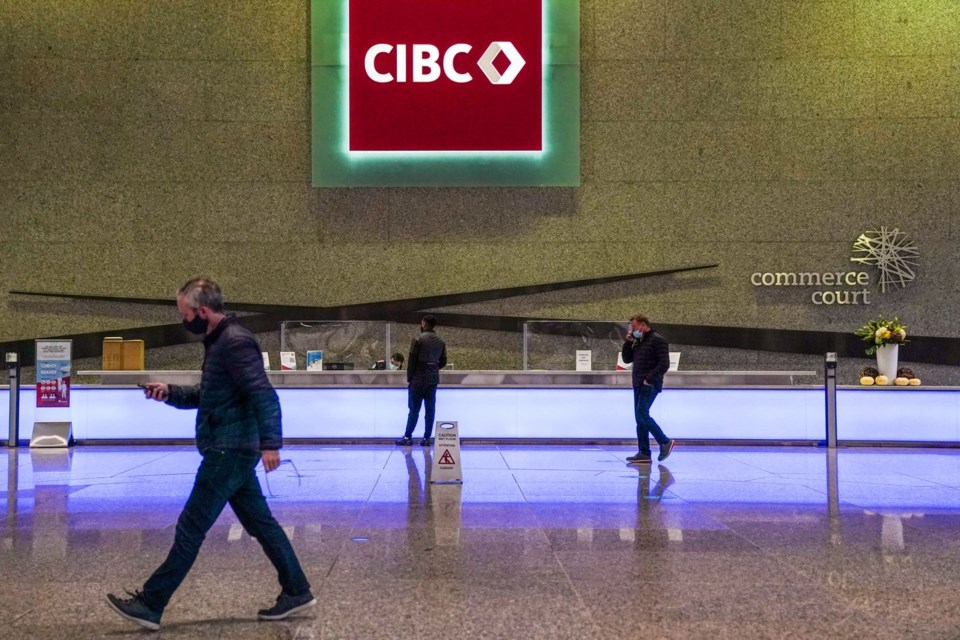TORONTO — Results from Canadian banks this quarter showed a range of views on what's ahead for the economy, but were largely in agreement that the hit from tariffs and trade uncertainty hasn't been as bad as feared so far.
The banks showed a clear concern for the near-term financial future as the Big Six added $6.36 billion in provisions for credit losses in the second quarter, up from $4.36 billion last year.
But despite the billions shifted from profits to provisions, they still on the whole made more in earnings in the quarter ending April 30 than last year, despite the overhang and uncertainty of U.S. President Donald Trump's mercurial policy swings.
Together, they made $22.4 billion, or $13.8 billion when stripping out TD's one-time take from a big asset sale, up from $13.1 billion last year.
"We remain comfortable with the overall strength of our Canadian consumer portfolios," said CIBC chief risk officer Frank Guse on an earnings call Thursday, echoing comments from other banks on how well things have so far held up.
"Despite the economic challenges, our impaired losses continue to be at the low end of our guidance," he said.
CIBC earnings came in well above the expectations of analysts, who had figured banks in general would be adding more to their provisions in the quarter ahead of potentially rough days ahead.
National Bank, BMO and TD also came in ahead, while Scotiabank and RBC missed estimates as they instead added more provisions than expected.
"While we have not seen a meaningful deterioration in credit, our base-case forward looking indicators have worsened," said Scotia chief executive Scott Thomson on an earnings call Tuesday as he explained the bank's almost 40 per cent boost to provisions from last year.
RBC decided to take a hard look at what could go wrong ahead, even as it acknowledged the impacts so far from the tariff hit to Canadian businesses haven't been too severe.
But given the trade-related uncertainty, the bank, which had also been firmer than others in a post-pandemic recession call, factored in a fairly worst-case scenario to gauge how much it should prepare.
"This new scenario reflects the potential for a severe North American recession, driven by an escalating global trade war and rising geopolitical risks that translate into a rapid rise in unemployment, higher inflation, disruptions in supply chains, and a sharp decrease in asset prices," said RBC chief risk officer Graeme Hepworth on an earnings call.
The bank's outlook helped lead it to set aside $1.42 billion for potentially bad loans, up from $920 million a year earlier, and changed where the bank was allocating reserves.
CEO Dave McKay said he knew conservatism would lead to a miss compared to the street, but did it anyway because the models showed what could happen.
RBC did also boost its dividend, and announced a share buyback program in what he said was a show of confidence in the bank's finances.
Several other banks also announced dividend boosts, including Scotiabank for the first time in two years, as well as share buyback programs.
Banks were doling out more money as they reported consumers were still spending, though that spending was focused, and as mortgage delinquencies remained low despite unemployment creeping up.
Several also reported an extra bump from the uncertainty as market volatility led to National Bank reporting a 62 per cent jump in revenue from its financial markets on a trading spike, while CIBC said its adjusted trading revenue was up 48 per cent from last year.
Bank leaders also expressed optimism about what could be ahead for Canada with the Mark Carney-led government getting to work on the economy and promises like lower internal trade barriers and streamlined regulation.
Thomson at Scotiabank said he was encouraged by the expected focus of government on issues of growth and productivity.
"While weaker consumer and business confidence is impacting near-term loan growth and capital markets activity, the future looks bright for Canada."
This report by The Canadian Press was first published May 29, 2025.
Companies in this story: (TSX:CM; TSX:TD; TSX:BNS; TSX:RY; TSX:NA; TSX:BMO)
Ian Bickis, The Canadian Press



